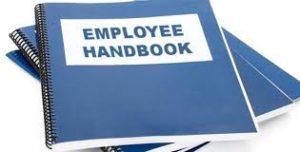New government standards provide clarity for employers on employee handbooks
The National Labor Relations Board (NLRB) is a federal agency that protects the rights of private sector employees to join together, with or without a union, to improve their wages and working conditions.Earlier this month the NLRB issued new guidelines for balancing the impact of workplace rules on employees’ ability to exercise their rights to organize, to collectively bargain, or engage in other “concerted activities” related to working conditions. These guidelines could affect your company’s workplace rules and policies, such as those contained in an employee handbook.
The guidelines divide workplace rules into three categories. Category 1 includes types of rules that are, in general, lawful and won’t affect employees’ rights. Category 2 includes rules that may or may not be unlawful but will be evaluated by the NLRB on a case-by-case basis should an employee bring a complaint, taking the context of the rule and the workplace into account. Category 3 includes rules that are unlawful because they prohibit or limit the exercise of employees’ rights under federal labor law. The following is a very brief summary of the types of rules in each category:
Category 1: Rules that are generally lawful
- Civility rules: rules that prohibit conduct that affects harmonious interactions, is rude, disparaging, or otherwise socially unacceptable, including offensive language, name calling, etc.
- Insubordination rules: rules that prohibit insubordination, being uncooperative with supervisors or fellow employees, or behavior that does not support the employer’s goals and objectives.
- Disruptive behavior rules: rules that prohibit disorderly conduct or behavior that creates disturbances or discord with other employees, customers, etc.
- Defamation/misrepresentation rules: rules prohibiting communications about products, services, customers or employees that are defamatory or misrepresentations (this does not prohibit critical comments about the employer, as an employer, which is protected speech).
- Rules protecting confidential or proprietary information: these rules are allowed as the company had a legitimate interest in protecting such information and doing so does not negatively affect employees’ rights
- Rules prohibiting photography or recording: rules that prohibit recording of conversations with other employees, manager, outside parties, or meetings, without prior approval, are allowed
- Rules against use of employer logos or other intellectual property: allowed to keep employees from using for personal gain
- Rules requiring authorization to speak for the company: it is lawful to prohibit employees from speaking critically about the company to others in a way that suggests they are doing so on behalf of the company, or that the company has approved the remarks.
Category 2: rules that require case-by-case review
- Broad conflict-of-interest rules that do not specifically target self-enrichment or fraud.
- Confidentiality rules that are too broad or vague (refer to “the company’s business” rather than specific types of information)
- Rules that prohibit disparagement or criticism of the employer (as opposed to the civility rules that relate to fellow employees, which are permitted)
- Rules that generally prohibit speaking to the media or to third parties, as long as the employee is not purporting to speak on behalf ofthe employer
- Rules banning off-duty conduct that might harm the employer or that specifically ban participation in outside organizations
- Rules against making false or inaccurate statements
Category 3: rules that are unlawful limits on employee rights
Rules that prohibit employees from disclosing or discussing wages, salaries, or other income, their performance, or other working conditions with other employees
- Rules prohibiting employees from disclosing information about their employment or working conditions at the employer to any media course
- Rules against joining any outside organizations, not just unions, or voting on any matters concerning the employer
Takeaway for employers
Remember: these rules apply to almost all private-sector employees, whether or not they belong to a union. The NLRB can impose penalties for violations of these protections, including cease-and-desist orders, or reinstatement and back pay for employees fired for exercising protected rights.
If your workplace rules or employee handbook have not been revised in the past year, you should review them to ensure that they do not violate the new NLRB guidelines. Employers need to consider what legitimate business purpose a rule serves if it could negatively affect an employee’s right to engage in protected activities. Doing so will help protect an employer if the rule is challenged.
Please contact Spitz Legal Counsel if you have questions or would like to schedule a review of your handbook and related policies, by phone at 720-575-0440, or by email at mark@spitzlegalcounsel.com.

